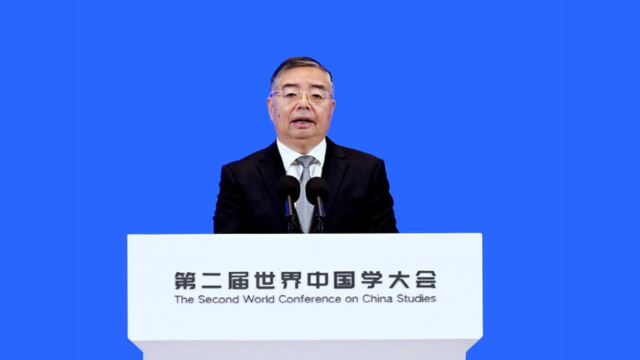Moving from “Sinology” to “China Studies” signals Beijing’s attempt to control and manipulate international scholars—some of whom are happy to cooperate.
by Hu Zimo

On October 14, 2025, the Second World Conference on China Studies opened in Shanghai, drawing over 500 scholars, diplomats, and cultural figures from more than 50 countries. Co-hosted by the State Council Information Office and the Shanghai Municipal Government, the event was presented as a celebration of intercultural dialogue and scholarly exchange. However, beneath the polished rhetoric of mutual understanding and civilizational harmony, the conference served a more strategic and ideological purpose: the global reengineering of China-related scholarship to align with the Chinese Communist Party’s (CCP) political narrative.
The keynote speech was delivered by Li Shulei, head of the CCP’s Publicity Department—formerly and more transparently known as the Propaganda Department. His presence was no ceremonial gesture. It was a declaration of intent. Li’s speech laid out a clear directive: the world must transition from “Sinology,” a field rooted in independent academic inquiry, which he characterized as orientalist, colonialist, and passé, to “China Studies,” a Party-sanctioned framework designed to project a curated image of China’s greatness and legitimacy.
Li emphasized the importance of “telling China’s story well,” a phrase that has become a euphemism for ideological conformity. He urged scholars to “deepen understanding of China’s modernization path” and “contribute to the construction of a global civilization,” carefully avoiding mentioning the Party’s authoritarian practices, censorship, or human rights abuses. The speech was not about scholarship—it was about narrative control.
The distinction between “Sinology” and “China Studies” is not merely academic. Sinology, rooted in centuries of philological, historical, and philosophical research, has produced generations of scholars grappling with Chinese civilization’s complexities, including its contradictions, tragedies, and triumphs. It is a discipline governed by methodological rigor, critical inquiry, and intellectual independence.
“China Studies,” as envisioned by the CCP, is a political instrument. It is designed to legitimize the Party’s rule, glorify its achievements, and suppress critical perspectives. It replaces scholarly skepticism with ideological loyalty, rewards those who echo the Party’s talking points, and marginalizes dissenting voices.
Li praised the conference participants for “enhancing mutual understanding” and “telling China’s story well,” while lauding foreign scholars who “spoke highly of China’s development.” The piece made no mention of the mass surveillance of citizens, the internment of Uyghurs, the suppression of religious groups, or the erosion of press freedom. Instead, it celebrated the ideological alignment of foreign participants as evidence of China’s growing “discourse power.”

I am sure many foreign scholars attended in good faith. They came to exchange ideas, build bridges, and explore China’s rich cultural heritage. Their participation reflected a genuine interest in understanding China’s role in the world and its historical contributions to global civilization.
However, those who gave interviews extolling China’s international role and domestic achievements—while remaining silent on its authoritarian practices—did a disservice to honest scholarship. Their complicity, whether intentional or naive, lent credibility to a conference that was less about understanding China and more about endorsing the CCP’s ideological agenda.
Some praised China’s “unique path to modernization” without acknowledging the cost in civil liberties. Others spoke of “cultural confidence” while ignoring the forced assimilation of ethnic minorities. A few even cited China’s “global leadership” without mentioning its aggressive censorship of academic discourse both at home and abroad.
The World Conference on China Studies was not a celebration of academic inquiry. It was a stage-managed spectacle designed to rebrand the Party’s narrative as a global consensus. It sought to replace critical scholarship with ideological affirmation and to transform foreign academics into unwitting ambassadors of the CCP’s worldview.
This is not a new strategy. The CCP has long sought to control how China is perceived abroad, from Confucius Institutes to state-sponsored media campaigns. However, the elevation of “China Studies” as a global academic paradigm marks a new phase in this effort—one that seeks to institutionalize ideological conformity within the very structures of international scholarship.
The stakes are high. If the global academic community allows CCP-controlled “China Studies” to supplant Sinology, it risks losing its ability to critically engage with one of the world’s most complex and consequential societies. It risks becoming a chorus of praise rather than a forum for inquiry.
Scholars must resist the temptation to trade integrity for access. They must insist on the right to ask difficult questions, examine uncomfortable truths, and speak honestly about China’s achievements and failures. Only then can scholarship remain a tool for understanding rather than a weapon of propaganda.
In the end, the future of China-related research depends not on the directives of Party officials, but on the courage of scholars to uphold the principles of intellectual independence. Anything less is not scholarship—it is complicity.

Uses a pseudonym for security reasons.



